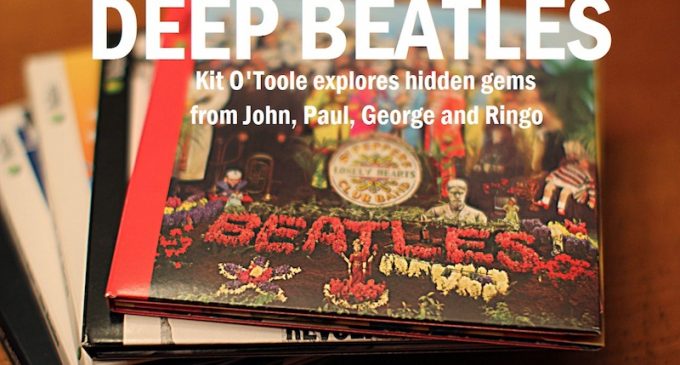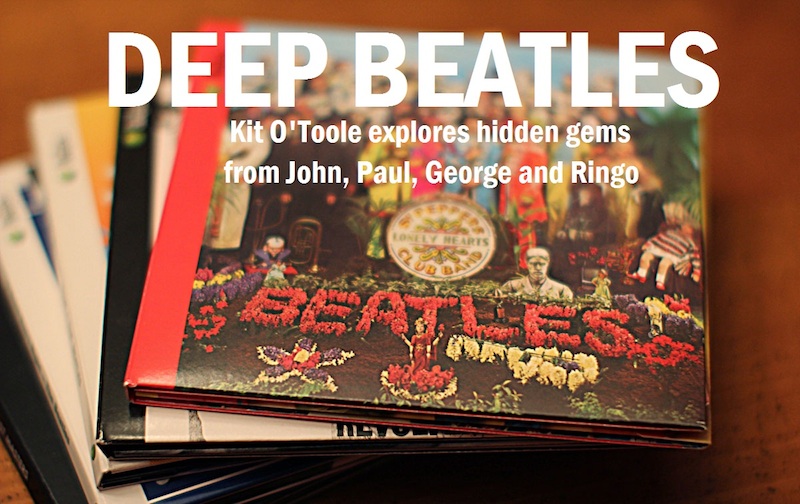The Beatles, “For No One” from Revolver (1966): Deep Beatles

“Why Did It Die?” The Beatles did not write and record a song with that title — right? In truth, they did, except it was under a revised title: “For No One.”
Paul McCartney told biographer Barry Miles that he composed the track while on a 1966 skiing holiday in Switzerland. “I suspect it was about another argument,” he says in Many Years from Now. “I don’t have easy relationships with women; I never have. I talk too much truth.” In Anthology, McCartney also explained what he liked most about the song. “I remember the descending bass-line trick that it’s based on, and I remember the character in the song — the girl putting on her makeup.”
The working title of the composition was “Why Did It Die?” and featured even darker lyrics, as printed in Things We Said Today: The Complete Lyrics and a Concordance to the Beatles’ Songs, 1962-1970 by Colin Campbell and Allan Murphy:
Why did it die?
You’d like to know.
Cry and blame her.You wait
You’re too late
As you’re deciding why the wrong one wins, the end begins
And you will lose her.Why did it die?
I’d like to know.
Try to save it.You want her
You need (love) her
To [So?] make her see that you believe it may work out some day
You need each other
Recording began at Abbey Road Studios on May 9, 1966; McCartney played bass, piano, and clavichord (borrowed from Martin), while Ringo Starr played drums and tambourine. The Beatles recorded 10 takes of the rhythm track. The last of these was deemed best, so they added more percussion and harpsichord to the take. On May 16, McCartney completed overdubbing his lead vocal. According to the Beatles Bible, the tape was slowed to 47.5 cycles from the typical 50, which sped up the vocals and made them sound a bit higher. Martin and Geoff Emerick then made tape reductions to free up space on the four-track tape. They were numbered takes 13 and 14, with No. 14 ultimately chosen for the eventual French horn overdub.
Martin and McCartney decided the song needed an even more distinctive element; they subsequently selected the French horn. Originally Dennis Brain, then the premier horn player in Britain, was booked to perform the solo. Tragically Brain was killed in a car crash before the May 19 session, so Alan Civil, another respected musician, replaced him. According to Miles, McCartney hummed the melody he wanted and Martin wrote the score.
When finished, Martin realized that the high note went just beyond the horn’s range; he and McCarney figured that a seasoned player such as Civil could still accomplish the feat. As McCartney told Miles, Civil read the score on the day of recording and said, “George, you’ve written a D [in Anthology, McCartney said it was a high F].” “George and I just looked at him and held our nerve and said ‘Yes?’” McCartney recalled. “And he gave us a crafty look and went, ‘Okay’.” Years later, Civil told Mark Lewisohn in Complete Beatles Recording Sessions that “I played it several times, each take wiping out the previous attempt. … For me it was jut another day’s work, the third session that day in fact, but it was very interesting.”
While Civil played the solo as requested, Paul McCartney was not initially impressed with the performance. “Paul didn’t realize how brilliantly Alan Civil was doing,” George Martin said in the Anthology companion book. “We got the definitive performance, and Paul said, ‘Well, OK, I think you can do it do it better than that, can’t you, Alan?’ Alan nearly exploded. Of course, he didn’t do it better than that, and the way we’d already heard it was the way you’d hear it now.”
“For No One” begins abruptly, McCartney’s voice sounding atypically dour while crooning the opening lines: “your day breaks, your mind aches.” The narrator may be describing his own experience with dying romance, but deflects it by shifting the perspective to the second person. This method makes the story slightly less personal and confessional, although McCartney previously suggested it was at least partially autobiographical. The narrator paints a picture of an aloof woman who no longer needs his love. In fact, one can argue that like “Eleanor Rigby,” this song addresses isolation, both self-imposed and unintentional. As she wakes up and “makes up” for the day, she apparently ignores the narrator, for “she no longer needs you.”
He tries to reconnect, to engage her, but he sings “in her eyes you see nothing, no sign of love behind the tears.” These tears are cried “for no one,” certainly not the narrator. He refuses to believe that his lover really no longer wants him, particularly when she leaves him at home, signaling her willingness to move on. Toward the end of the song, he finally realizes that their “love is dead” and feels the pain, knowing that there will be times when “all the things she said will fill your head, you won’t forget her.” The song concludes by repeating the chorus; the line “a love that should have lasted years” ends on an unresolved chord, suggesting that the narrator still cannot accept that their love is over – or perhaps that his pain is never-ending.




There are no comments at the moment, do you want to add one?
Write a comment